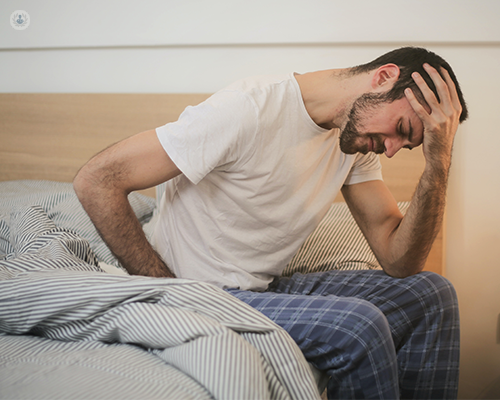Addressing lichen sclerosus
Autore:Leading consultant dermatologist Dr George Kravvas answers some of the most commonly-asked questions about skin condition lichen sclerosus, in this informative article.

What is lichen sclerosus?
Lichen sclerosus (LSc) is a chronic condition that affects the genitals.
Reasons why LSc occurs
LSc occurs due to the longstanding trapping of small droplets of urine by the foreskin or skin folds. The longstanding presence of urine leads to inflammation and results in symptoms and changes in the appearance of the genitals.
The inflammation associated with LSc usually occurs slowly over many years in a subtle manner but may also present acutely with sudden florid inflammation.
Other than inflammation, LSc can lead to permanent change in the architecture of the genitals (e.g., fusion or resorption of the lips in females, or loss of the frenulum in males).
What are the common symptoms and signs of lichen sclerosus?
LSc may be present for years without causing any symptoms. Furthermore, even though LSc causes visual changes to the genitals, these can be slow, or subtle, and can go unnoticed by patients and physicians, or be perceived as ‘normal’.
In men, the commonest symptoms of LSc are tightness and/or splitting of the foreskin, irritation, itch, and redness. In women, irritation, discomfort, itch, and redness are the commonest presenting symptoms.
LSc can also present in both males and females with discomfort during or after sexual intercourse.
How is lichen sclerosus diagnosed, and what are the key diagnostic methods?
LSc is diagnosed following careful genital examination by a specialist. The condition can be recognised by the telltale changes that it causes.
A skin biopsy is not required for the diagnosis of LSc, unless it is to diagnose other coexisting lesions and to exclude malignancy.
What treatment options are available for managing lichen sclerosus?
LSc can be treated successfully in most patients with a combination of lifestyle changes, and topical agents, such as barrier preparations and topical steroids.
In males, severe or treatment-resistant cases of LSc may require a circumcision.
Are there lifestyle changes or home remedies that can help alleviate lichen sclerosus symptoms?
Patients with LSc should limit the exposure of their genital tissues to urine. This can be achieved by squeezing or shaking to expel all the drops of urine from the urethra after micturition. Some patients find gently dabbing with a tissue or washing the genitals after micturition to also be of help.
- The use of foaming soaps for washing can irritate the genitals. This ought to be avoided and the use of bland thick ointments as soap substitutes is recommended.
- Smoking cessation and weight loss are also encouraged where needed.
What is the long-term outlook for individuals with lichen sclerosus, and are there any complications to be aware of?
Patient with untreated LSc have an increased risk, compared to the average population, for developing genital precancer or cancer.
- LSc can affect the urethra and cause blockages, leading to changes in the normal stream of the urine.
- Furthermore, in some men, LSc can lead to complete inability to retract the foreskin (phimosis).
The aim of treatment is to quench the inflammation, minimise the sexual and urological complications, and restore normal function.
With appropriate treatment, most patients can achieve resolution of their symptoms and drastic reduction in their risk of developing genital malignancy.
If you require expert treatment for lichen sclerosus, arrange a consultation via Dr Kravvas’ Top Doctors profile


